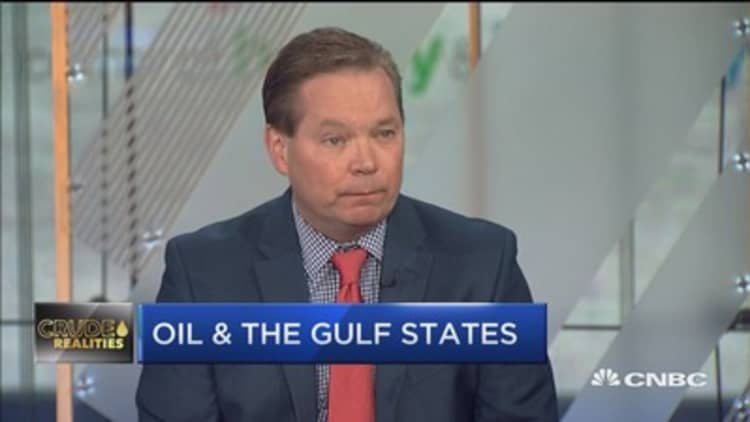When oil producers meet Monday, their alliance will look frayed, showing just how tough their goal of stabilizing the world oil market has been, analysts say.
There is much focus on the meeting of the five-member Joint Ministerial Monitoring Committee, set up to oversee compliance of the deal struck by OPEC, Russia and others as an effort to boost world oil prices.
Analysts say the committee will likely recommend maintaining the policy of holding back output at current levels, but efforts will be made to bring Nigeria and Libya into the framework because of the recent unexpected return of their production.
Oil prices fell Friday after a report that OPEC's July supply could rise by 145,000 barrels over June, driving production above 33 million barrels per day. West Texas Intermediate crude futures fell 2.5 percent to $45.77 per barrel, and Brent was down 2.6 percent at $48.
"Clearly, OPEC has a lot of cracks," said Francisco Blanch, head of commodities and derivatives strategy at Bank of America Merrill Lynch. "The cartel is certainly under a fair amount of pressure from members that feel they shouldn't be cutting production here. I think the meeting is going to be more routine than anything else. There will be some recommendations."
The fact that prices have fallen again and now languish under $50 is hurting OPEC producers. "Ecuador wants to pull out, and then Iraq has been talking about increasing output by a half million barrels," Blanch said. Ecuador left the agreement and said it is raising production.
The monitoring committee meeting in St. Petersburg, Russia, includes Algeria, Kuwait, Russia, Venezuela and Oman, and other ministers, from Saudi Arabia and elsewhere, could participate as observers, Blanch said.
"There's been talk of a Saudi cut being thrown around. … I don't think it's very likely right now," Blanch said. Saudi Arabia was already shouldering the biggest portion of OPEC's cut, as its largest producer, but it has also previously said it would make room for Libyan and Nigerian output if necessary.
John Kilduff of Again Capital said there's been speculation that Saudi Arabia could keep as much as 1 million barrels a day from the world market in August, a time of year when it normally keeps more crude at home for domestic use. "I think we're set up for a 'buy the rumor, sell the news' type of market," said John Kilduff of Again Capital.
"The only surprise to the market would be if the Saudis stood up and cut more," said Kilduff. "But there doesn't appear to be much appetite for further cuts."
OPEC and other producers, such as Russia, have agreed to hold back 1.8 million barrels a day, but an initial jump in oil prices resulting from the accord spurred more production from U.S. shale drillers and others. The U.S. industry has become increasingly more efficient, as it exploits new technologies, and it is expected to produce an average 9.3 million barrels a day this year, and 9.9 million barrels a day next year.
World oil supplies have remained stubbornly high, and even though supply has been drawing down in the U.S. and elsewhere, there's still a lot of oil. Many analysts have brought down their price targets as crude prices fell and stayed stubbornly low. Blanch expects oil prices to remain between $45 and $50 per barrel this year.
Blanch said OPEC is boxed in. "They cannot get out of this one very easily. It's either fast death, slow death or death by a thousand cuts. If they decide to break up the deal and increase production, it's a fast death. If they keep the deal as it is, it's a slow death. If they cut production and give away market share to U.S. shale, it's a death by a thousand cuts," Blanch said.

The return of production by Libya and Nigeria surprised the market. Nigeria's production was up to 1.75 million barrels a day last month, up more than a million barrels from earlier this year, said Kilduff. Libyan production jumped by about 500,000 barrels a day last month, from its 2016 average of 380,000, according to RBC. Neither country is expected to have much more capacity to increase output.
"Libya and Nigeria are sending representatives to the meeting, but not surprisingly they are reluctant to accept any output restrictions," said Helima Croft, global head of commodity strategy at RBC.
"Saudi Oil Minister Khalid Al-Falih may in the end have to make good on his May 25 pledge to make room for these countries by further restricting output, but we still do not expect a much deeper cut to be announced Monday," Croft wrote in a note. Saudi Arabia averaged output of 10.4 million barrels a day last year, and was at 10 million barrels last month, according to RBC.
Ecuador's exit from the OPEC agreement underscores the pressures on cash-strapped nations. "Keeping the coalition of the willing together will be the central challenge for Saudi Arabia and Russia, the co-pilots of the historic OPEC/non-OPEC production agreement. They will have to walk a fine line between showing strong resolve to re-balance the market, while avoiding a sudden display of panic so soon after the May OPEC meeting," Croft wrote.
She said the committee's statement Monday should signal a determination to deal with the extra volume from Libya and Nigeria, either by ending exemptions for the two countries or future output cuts.


